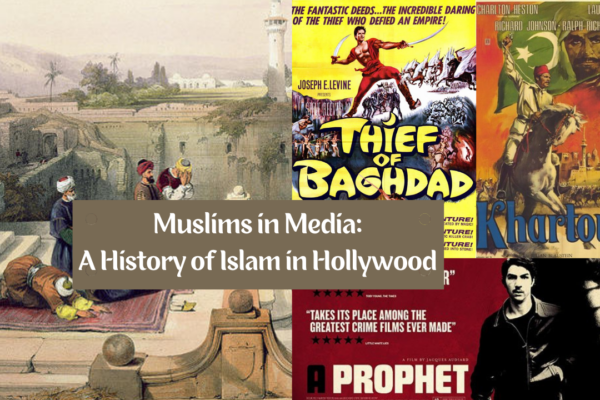Hollywood was a place that we were allowed to watch, but not allowed to be a part of. That’s just the way it was.
Hollywood was a place that we were allowed to watch, but not allowed to be a part of. That’s just the way it was.
“Hollywood was a place that we were allowed to watch, but not allowed to be a part of. That’s just the way it was.”
It was interesting to see that American filmmakers were intent on creating a movie about the 2013 Boston Bombings so soon after the attack. Not that they don’t have a right to; in fact stories like these, which focus on the rise of love and courage through tragedy deserve to be told. Unfortunately though, I always feel a bit of unease when a movie decides to tackle an Islamist attack – for obvious reasons. It’s simply not nice watching your faith undergo a blanket vilification due to the actions of a few politically-motivated imbeciles.
Growing up, it was quite normal for us to see ourselves on the silver screen in two scenarios – firstly as a terrorist/evil character/backwards thinking individual/collateral damage, or secondly absolutely nowhere at all. It was fine growing up – we were used to it. Hollywood was a place that we were allowed to watch, but not allowed to be a part of. That’s just the way it was, and it’s what we accepted. Even despite that, I’ve always loved film.
The earliest memory I probably have in my life, is sitting down at my grandparents’ house every weekend, and watching a VHS copy of Jurassic Park, over and over again. Film impacts us all, and it’s often a reflection of our deeper selves and where we are at stages of our life. So whenever I sit down to watch Jurassic Park again, I feel a certain nostalgia for my early years. Someone else watching the same film will feel something completely different. Hence why for me, film is a lot like poetry. The visuals, the stories and the characters depicted all come together like a work of art, and much like art, it has different impacts on different people.
Patriot’s Day shows that Islamophobia is still alive in Hollywood
My unease for Patriot’s Day was defeated though, when the trailer was released, and my hopes were risen. Sure, there were evil, Islamist characters, but in one depicted interrogation scene, I saw that the veil-covered wife of Tamerlan Tsarnaev, Katherine Russell, was sitting opposite an FBI officer who was also wearing hijab. “Wow”, I thought, “so Hollywood is now trying to show us that there are two types of Muslim – good and bad. It’s not quite what we want, but it’s definitely a start.” After all, society is moving forward, and Hollywood needs to catch up. In 2017, a blockbuster movie would look out of place if it didn’t reflect the attitudes of time – a world where despite living in a peak of Islamophobia, a great number of people are surprisingly open-minded when it comes to minorities, and Muslims in particular.
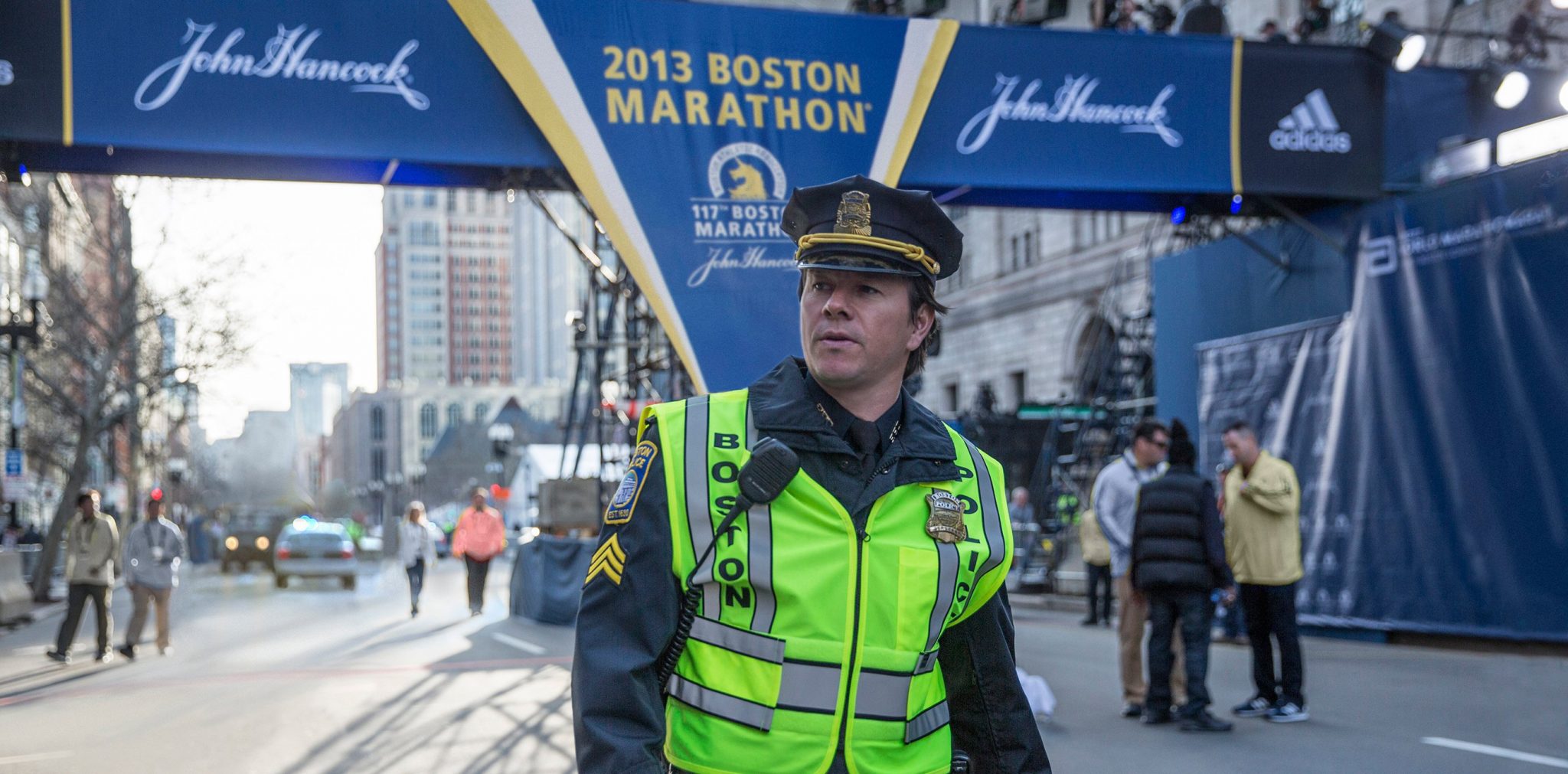
But then I watched the whole film.
The scene in question started. Katherine Russel, fully veiled as in the trailer, was under the questioning of the FBI about her husband’s terrorism. The FBI agent, also fully veiled, walks in and sits down opposite her.
“Asalaam alaykom”, the agent says.
Tsarnaev’s wife doesn’t reply.
“You disrespect the Prophet?” the agent asks.
Here I was hopeful. Then the conversation continues:
“Your best friend works at a Starbucks, where you tried to convert her to Islam. Are there more bombs?”
No response.
“What are the rewards of a wife of a Mujahid if he becomes Shahid?”
“I have rights – ” Katherine exclaims.
“You ain’t got [expletive] sweetheart.” (here, a crowd during a screening in California erupted in cheers)
After a brief exchange of dialogue like the above, Katherine then says the following:
“For a Muslim woman, marriage is a lilting dance of duality. Strength and submission. Beautiful, selfless, rapturous love of two masters. The carnal and the divine. The life a Muslim woman lives is a dangerous and difficult one if she does not submit to her husband. There’s a spot reserved for her in hell. Yes, my husband kissed me before he left, and he will kiss me again when I see him in Heaven. And you can’t prove anything. Mashallah. Ya Allah.”
Okay. So we expect a rebuttal right? The good Muslim woman to reply and correct her? To show that obedient, religious Muslims do not think like this?
But no. Nothing. The dialogue ends there.
What’s even worse than this, is that the FBI agent walks out of the room, and pulls off her hijab. She’s not a Muslim at all – she just put on the veil to try and coerce a confession out of Katherine. “How could a mother do that to her daughter?” another agent asks, as the rest look on in disbelief and shock. Now I have to ask, what would your conclusion be, if you were an innocent, normal average Joe, taking your family out to the theatre to watch this film?
If the filmmakers wanted to be quiet on this issue, they would have left this ficticious scene out. If the filmmakers wanted to give the message that there are in fact some good Muslims out there – they would have offered a rebuttal to Katherine’s words. But no. Nothing.
I was infuriated. Another damn Hollywood film that is doing nothing to tell its massive audience not to fear Muslims, and in fact sends the message that practicing Muslims are lost, stubborn, and driven to extremism by their ideology.
The film opens with a normal day in Boston: beautiful neighborhood; smiling White families who somehow manage to keep their smiles when going into work, all ruined by two Muslim brothers who fiercely believe in their religion. Don’t consider this insignificant. Patriot’s Day has been seen by millions of people. It has made $31,000,000 to this date. How many non-Muslims walked away from the theatres with a positive few of Islam? How many walked away hating the religion and the people that follow it?
American Sniper – Killing Muslims makes the heroes cry
Islamophobia in Hollywood is nothing new. If you were to take a trip back in time and examine the depiction of Muslims (and Arabs in particular) on film, it may leave you quite stunned.
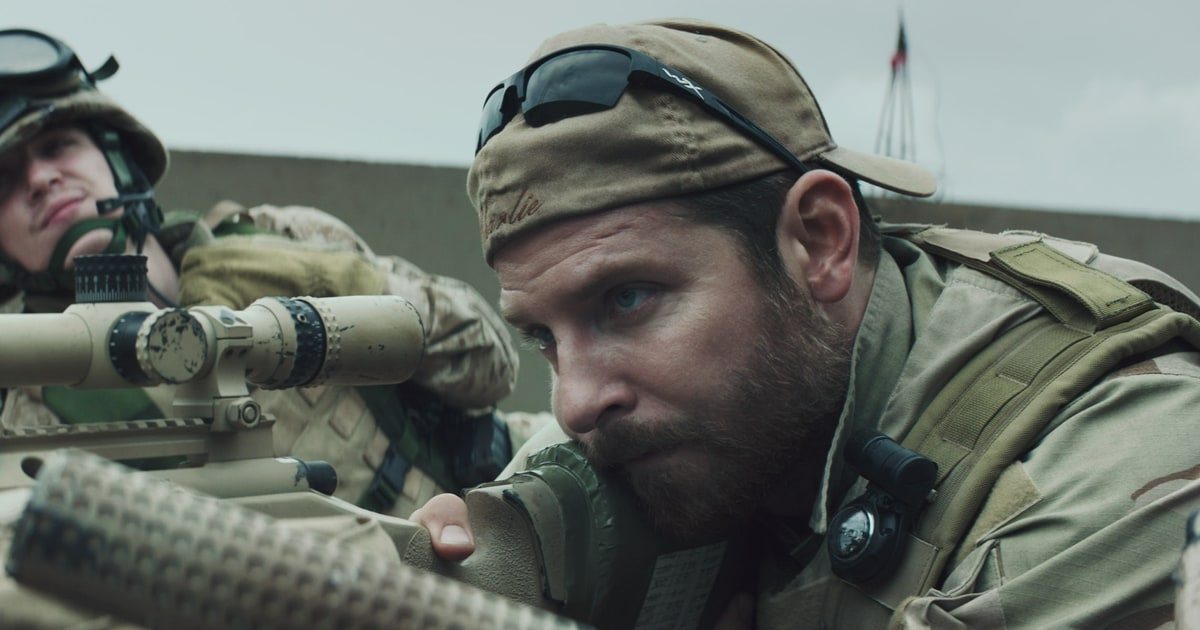
An obvious contender for most Islamophobic film in recent memory is American Sniper (2014). Directed by one of my once-admired directors Clint Eastwood, starring one of my once-admired actors Bradley Cooper, the film centres around US Navy SEAL Chris Kyle, who is the deadliest marksman in US military history with 255 kills. Of course, the real Chris Kyle was nothing like his onscreen depiction. The real Chris Kyle was someone who described killing as “fun”, something he “loved”. He believed that everyone he shot was a “bad guy”. “I hate the damn savages,” he wrote. “I couldn’t give a flying [expletive] about the Iraqis.” The movie doesn’t depict this at all however. It chooses to depict him as a man who is doing what he believes is necessary, and is left emotional by the number of people he has killed (oh, America).
Ignoring the questionably political motives (he joins the army after watching the Towers being attacked, then is suddenly in Iraq – as if the two are connected), the biggest problem with this film is that there is not a single good Muslim depicted in the entire 2 hours and 13 minutes. No wait sorry – there is one good Iraqi, who invites the soldiers into his home to eat – only to turns out to be a terrorist himself. Another scene, which you may have seen briefly in the trailer, is where Kyle has to make the terrible decision of whether or not to kill a child – a child – who is transporting an artillery bullet. Kyle decides to kill him.
Films like these affect the opinion of the public. On social media, there was outcry about the obvious bias, racism and plain wrongness of the film. The ticket sales however told a very different story, and the film was the number one grossing picture of 2014, taking in over $350 million. In the aftermath of the unfortunate unleashing of this film on the world, Abed Ayoub, the national legal and policy director for the American-Arab Anti-Discrimination Committee (ADC), told the Guardian that the complaints they received skyrocketed, with the rate of anti-Arab and anti-Muslim rhetoric being as high as it was during the opening of the Ground Zero Mosque in 2010.
Here are some colourful Tweets that went viral after the film:
“Great [expletive] movie and now I really want to kill some [expletive] ragheads”
“American sniper makes me wanna go shoot some [expletive] Arabs.”
“Nice to see a movie where the Arabs are portrayed for who they really are – vermin scum intent on destroying us.”
“Every time an American Armed Forces sniper pulls a trigger, those who would kill or maim an American warrior are no longer a threat.”
Rules of Engagement – Even Muslim kids are terrorists
However, there is one film Hollywood produced that outdoes even American Sniper for its racism and Islamophobia.
“Of all the Department of Defence films, the one that will stand the test of time as being the most racist is Rules of Engagement”, says Dr. Jack Shaheen, writer of Reel Bad Arabs. And he’s right – Rules of Engagement (2000) is outrageous – even by Hollywood’s standards.
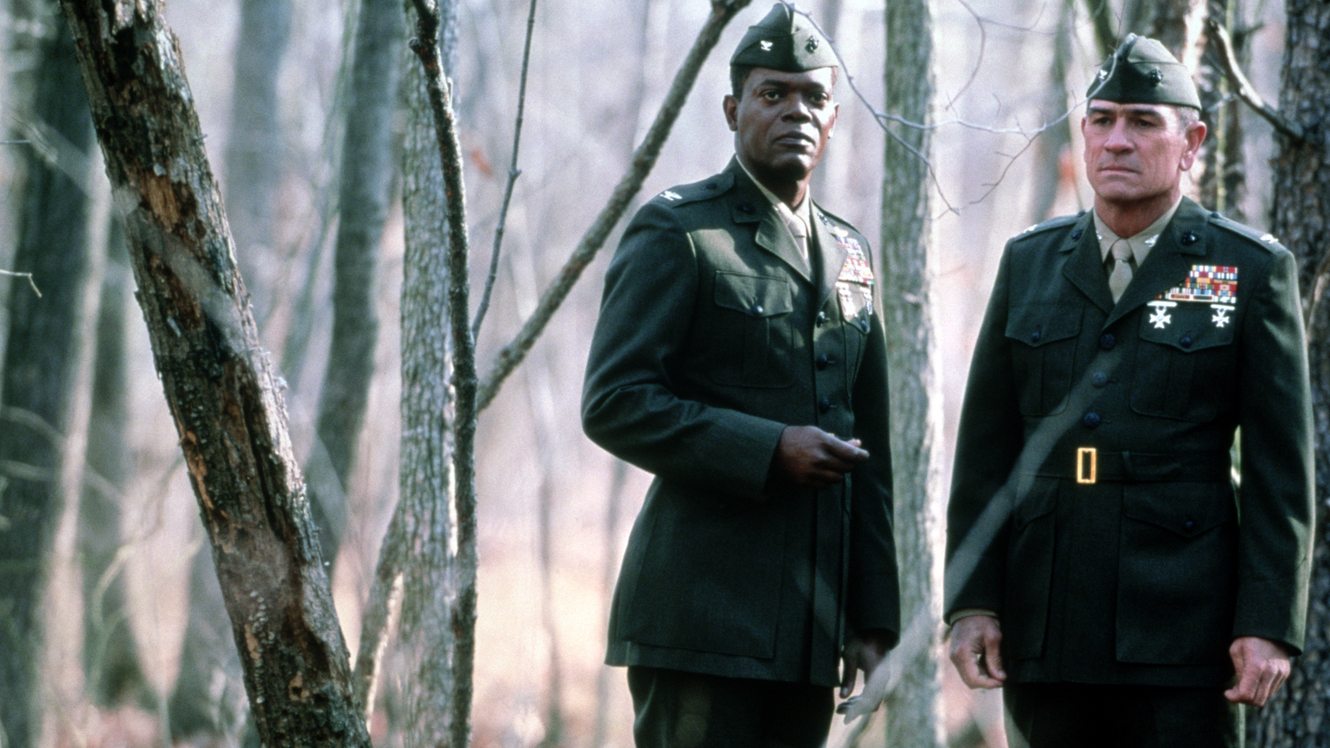
Amidst large Yemeni protests outside the American Embassy in Yemen, the marines are called in to evacuate the embassy. What follows is a massacre by the marines as they open fire on the protestors, killing men, women and children; led by Samuel L. Jackson (yes, few of our favourite actors are safe in this article). The rest of the movie is an investigation into the massacre. In a key shot, Jackson’s lawyer (played by Tommy Lee Jones – you’ll never watch Men in Black the same way again) sees a cute, beautiful amputee girl, who lost her leg in the shooting. Following her, he finds a tape, which changes the narrative completely. Playing it in court, the tape (in Arabic) states: “to kill Americans and their allies, both civil and military, is the duty of every Muslim who is able” (here Tommy Lee’s character cries).
It is revealed by the end of the film, that it was actually the Yemeni protesters (both men and veiled women) who whipped out AK-47s and fired on the marines first. Amongst them, in a scene that, mentioned by Dr. Shaheen “will live in Hollywood infamy”, it is revealed that the young, beautiful amputee girl, also whipped out a pistol, to fire on the Americans. When the massacre is replayed to us, with this revelation, the audience now sympathises with the marines opening fire on these men, women and children.
Homeland – Emmy award winning racism
Unfortunately Islamophobia is not limited to Hollywood, not by any means. Cable television, it can be argued, can have a greater impact on the narrative of the nation, considering that viewers watch it from the comfort of their own homes.
24 (we all love Jack Bauer don’t we?) has been notorious for its depiction of Muslims over the years. When the show’s fourth season aired in the UK, the Muslim Council of Britain felt that the Islamophobia of the show was so bad, they demanded that OFCOM investigate it for breaching broadcasting codes by misrepresenting ethnic minorities. “There is not a single positive Muslim character in the storyline to date” they said at the time.
In researching this subject a few months ago, I came across a video online of prominent 24 show-runner Howard Gordon, dated 2010, where, as a part of a panel with Dalia Mogahed titled ‘Who Speaks for Islam?’, he discusses his regrets in inadvertently writing Islamophobic storylines: “I hid behind my cement wall saying it’s just a television show, and I’m just writing a story… clearly what I was doing was having an impact beyond my own parochial interest in telling the most exciting story.” Sounds wonderful doesn’t it? A prominent writer admitting his faults and ignorance (ignorance is a word he himself used) in discussing the Muslim story. Unfortunately, Gordon went on to produce a show 2 years later, titled… Homeland.
Homeland, if you have not heard of it, is undoubtedly the most Islamophobic and racist show on television right now.
“If the writers can go out of their way to make Islam a suspect, they can go out of their way to make it innocent too.”
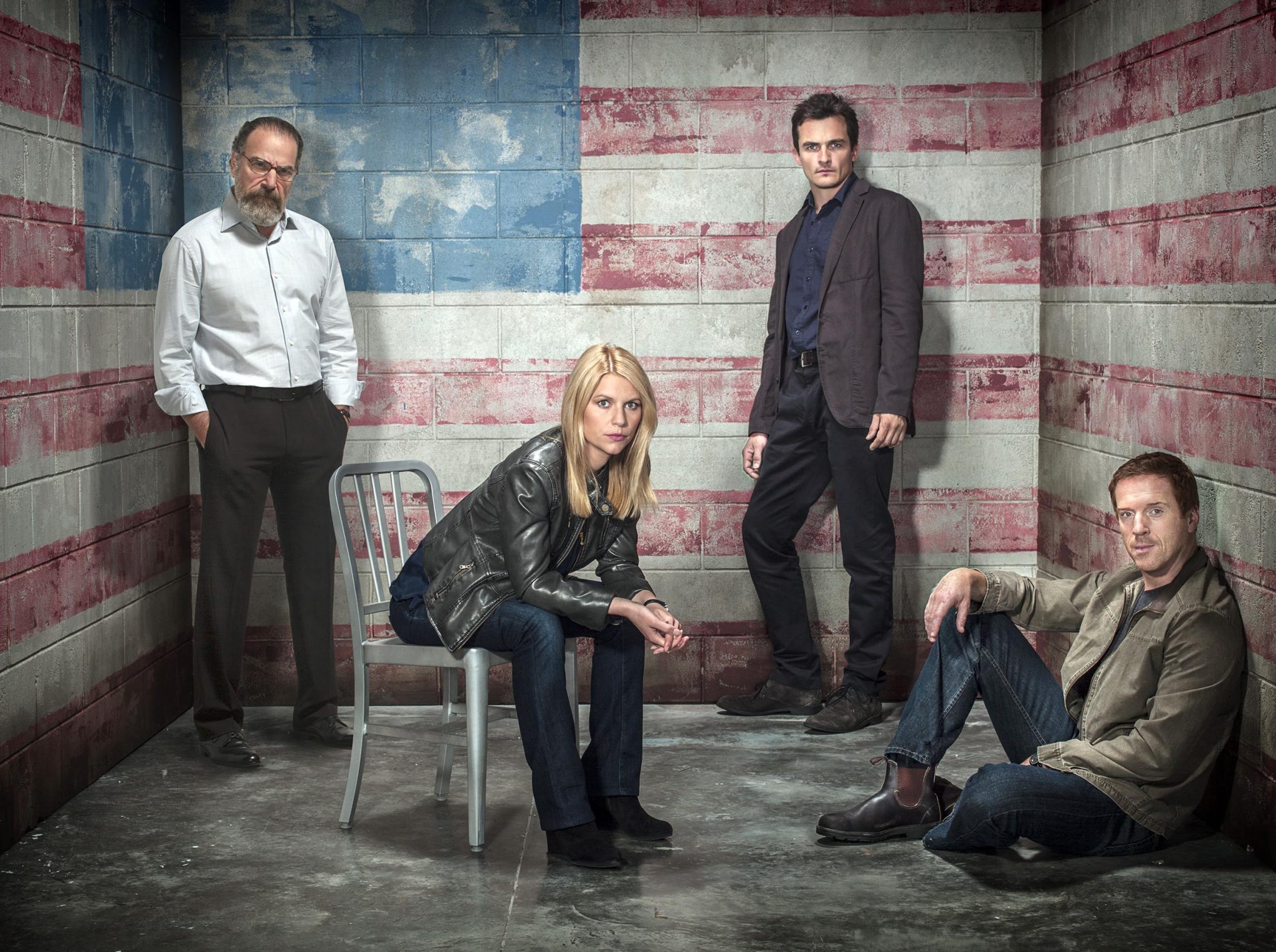
Season 1 focuses around Sergeant Nicholas Brody, a prisoner of war who returns from captivity after being presumed dead. The suspense that surrounds this storyline, is whether or not he has been turned by his captors into a terrorist. And what adds some spice to that storyline? He is secretly a Muslim. *Cue dark lighting and creepy music* as he lays down his prayer mat to pray every morning (in secret), and eerily uses his fingers to praise Allah.
The problem is when other characters find out about his conversion (let’s just put aside the fact that he does try to blow up stuff in the name of Islam later) and demand answers to what he is doing, and why he is doing it, in desperation of understanding – he is silent. No-one, not even himself, explains what prayer is; what Islam is; what praising Allah means. And that is precisely the problem. There is no Muslim voice. And don’t let the producers or defenders of the show fool you into saying it is not a responsibility of the show – if the writers can go out of their way to make Islam a suspect, they can go out of their way to make it innocent too.
Is it so damn difficult to include a Muslim character in the show that speaks of the goodness of Islam? The real Islam that these terrorists don’t represent? No, it is not – but there unfortunately appears to be an ulterior motive by the producers and the writers to vilify Islam. If they felt an ounce of responsibility to protect the Muslim American community, or, forget that, to just show that Islam is a normal faith just like any other religion – they would have done so. And people like Howard Gordon, who admit that they need to be weary of the impact of their writings, fail to do so.
If that doesn’t frustrate you, my refusal to continue watching Homeland was challenged by a clip (below), where a meeting of military leaders come together to discuss how that can defeat the Islamist terrorist threat of the season. Peter Quinn – a lead character – comes forward and says the following:
“What do you think the beheadings are about? The crucifixions in Deir Hafer, the revival of slavery? Do you think they make this [expletive] up? It’s all in the book. Their [expletive] book. The only book they ever read – they read it all the time. They never stop. They’re there for one reason and one reason only: to die for the Caliphate and usher in a world without infidels. That’s their strategy and it’s been that way since the seventh century.”
To know something like the above was broadcast on national television, quite honestly, breaks my heart. Katie Hopkins wrote a whole article about it, praising the fictional character for saying what “our leaders just don’t dare say”. The genuine question I have is – what did producer Howard Gordon learn, or even claim to learn, back in 2010?
Film and television sways public opinion
Often, when we examine the root cause of Islamophobia in America, our first instinct is to blame Fox News, and the American news media in general. Granted, there is a debate about whether media reflects public opinion or public opinion reflects media, but let’s be honest here, Islamophobic rhetoric in the media is, at the very least, a can of gasoline pouring onto a small flame. No doubt, the loud, sensational racism and fear-mongering of Fox News seeps through to us on a daily basis. One thing to remember however – is that it thinks it’s louder then it really is.
“The number one news program on cable is Bill O’Reilly’s show. Do you know how many people watch his show every night? A little more than a million. In a country of 350 million people”, Reza Aslan says. “Do you know how many people watch the Big Bang Theory? 20 million… That’s how perceptions are truly framed in this country.”
In 2014, Joe Biden was speaking about how he had changed his mind on same-sex marriage. He mentioned that the opinion of most Americans regarding same-sex marriage had swung rapidly towards support of same-sex marriage. He said that what actually played a role in this transformation, was the sitcom Will and Grace, which features a number of gay characters. And while the media thrashed him for the statement, he was absolutely correct.
The media, in particular the film and television industries, have an incredible impact on public opinion, although existing for the sake of entertainment. What TV and film portray as acceptable to the public, leaves a direct – if even subconscious – impression on them. The more minority groups are represented fairly on film, the more they are accepted by wider society. The less they are represented, the more foreign they will be. And the more they are misrepresented, the more they will be misunderstood. That’s not to say that the industry is the sole swinger of public opinion, but given the vastness of the world and the inability of ourselves to see beyond the bubbles that we live in, the industry is the only window into the world that we have. Understandably, what we are watching are stories, not real life – but no one can deny the impact it has on the life, ideas and perceptions of the common viewer.
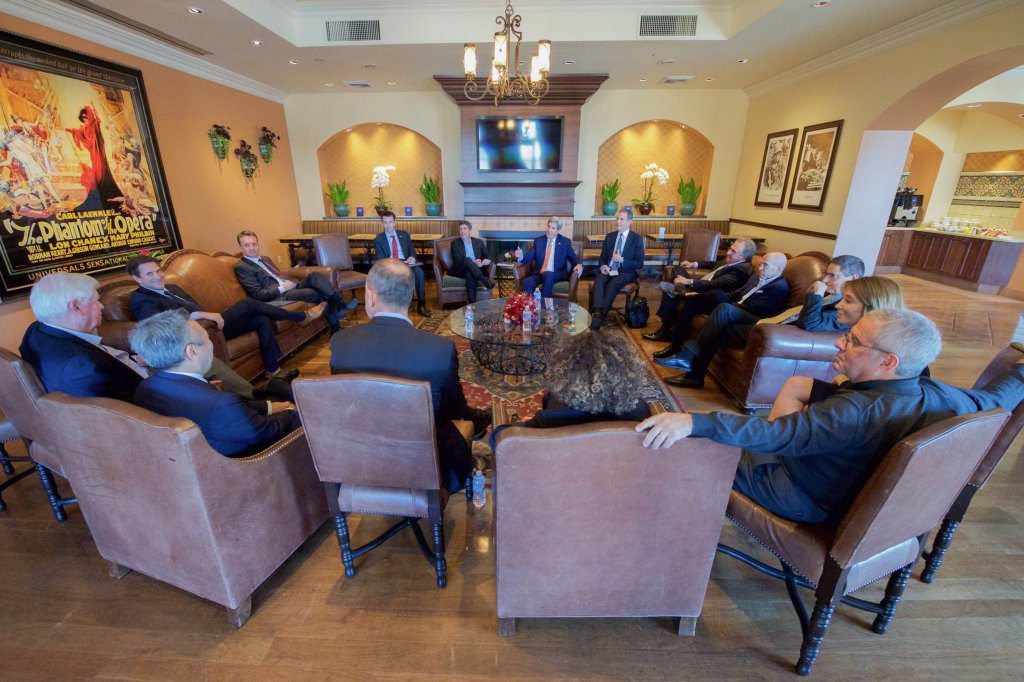
Though the data is quite outdated, Dr. Shaheen in his book ‘Reel Bad Arabs’, puts forward a shocking statistic: out of 1000 films that have Arab and Muslim characters (from the year 1896 to 2000), 12 were positive depictions, 52 were neutral portrayals of Arabs, and 936 were negative. Is it any surprise that the public have a major fear and distrust of Muslims?
And so the question arises: is it all a bleak world for us Muslims in Hollywood? Does the whole industry hate us?
There’s a glimmer of hope in Hollywood
Well, there are actually a (small) number of films that portray Muslims in a favourable light. Kingdom of Heaven (2005), directed by Ridley Scott, (watch the Director’s Cut – it’s almost a completely different film) was a discussion on how men use religion for the sake of power. It centres around the Crusades for the city of Jerusalem, and fascinatingly, seems to portray the Muslims in a much more positive light to the Christians of the time, who, whilst diversified, have a large section of them who abuse their Christian name by committing violence for the sake of gaining power. The Muslims also have issues, but are largely depicted as noble, understanding, and tolerant. At the end of the film, after capturing Jerusalem, the character Salahuddin returns a cross that has been thrown to the floor, to its pedestal, as a sign of Muslim tolerance toward other faiths (it is said that audiences in Beirut stood up and applauded when they saw this in theatres).
Representing Muslims in a positive light is the necessary respect a people deserve, and a common decency above anything else.
Syriana (2005) is another example – of the very few examples that exist – of a film that depicts Muslims in a good light. In the film, Alexandar Siddig’s character, Prince Nasir, is a forward-thinking, well-intentioned and well-educated figure who aims to bring rights, democracy and ethic means of economic growth to his country, and is ultimately killed for his work. It’s a rare example of an admirable character in Hollywood film, that happens to be a Muslim.
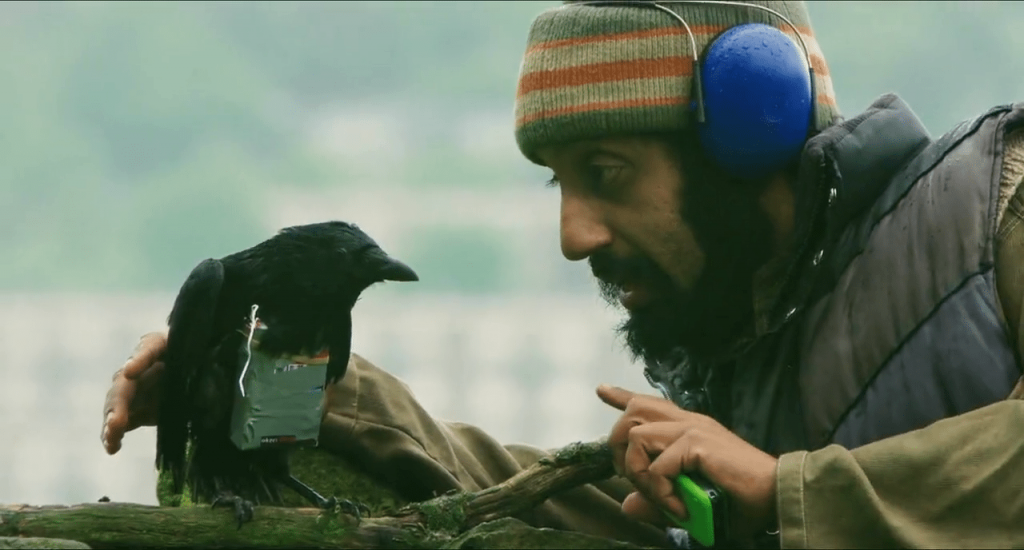
Other movies that attempt to portray Muslims in a positive light exist, such as Three Kings (1999), The Reluctant Fundamentalist (2012) and I’m sure every Muslim West of Pakistan has seen Four Lions (2010). But unfortunately, it’s just not enough. Even if we push aside the argument that public opinion really is affected by what they see on the silver screen – representing Muslims in a positive light is the necessary respect a people deserve, and a common decency above anything else. Can you imagine the unease you would feel seeing the Jewish people, or any other minority, represented in the same manner as Muslims have been on the silver screen? Now consider the reality. Why doesn’t the same unease exist when it’s Muslims depicted in this manner? Perhaps it is because we’ve become subjected to it for so long, and therefore we have, unfortunately, become tolerant of it.
So what is the solution?
Luckily, despite the fact that Patriot’s Day came out recently, we are living in an age where the greatest form of media by far is social media. Social media is making the world a much smaller place than it really us – ideas are being exchanged and interactions are taking place that would never take place on the ground. Public perception of Muslims is changing, and though Islamophobia is at a peak, I do not believe it means almost everyone fears Muslims. When the current President, Donald Trump introduced his immigration ban, the amount of protestors that came out to the streets and the airports and the amount of vocal uproar in defence of the Muslim community was simply astonishing. As a Muslim I have never seen anything like this in my life – a massive non-Muslim presence actually defending Islam. Now there exists a battle between the grip of social media and the grip of popular media for the soul of public opinion. So if a movie like American Sniper is released in the theatre, a ton of essays, Tweets and vocal uproar of its blatant racism are released online. This doesn’t, however, just mean we can sit back and relax.
Compare the disproportionate representation and vilification of Muslims in film, to the disproportionate representation and vilification of African Americans in film, which was not even that long ago. The presence and presentation of African Americans on screen did not come about because Hollywood had a change of heart. Rather, it came about because African Americans decided to get up and get involved in Hollywood – in film and television. They became their own directors, screenwriters, producers and actors. They became their own storytellers. One only has to watch Boyz n the Hood (1991) to get a sense of this. Twenty years later, and it still feels like the film is a breath of fresh air for the discriminated Black Los Angeles community to put together their own story and their own narrative. I’ll never forget the scene where Lawrence Fishbourne gathers some Black youth together, and reminds them that there is a reason a liquor store sits on every corner in their neighborhoods. That they have to aim higher, and take responsibility for control of their own neighborhoods. I picture in my head, a similar scene, but with a Muslim gathering some Muslim youth together, and demanding that they get their act together and take control of their own narrative. Because the most common commentary I’ve found by actors, directors and producers in Hollywood about minorities, is that they have to get involved to control and tell their own stories.
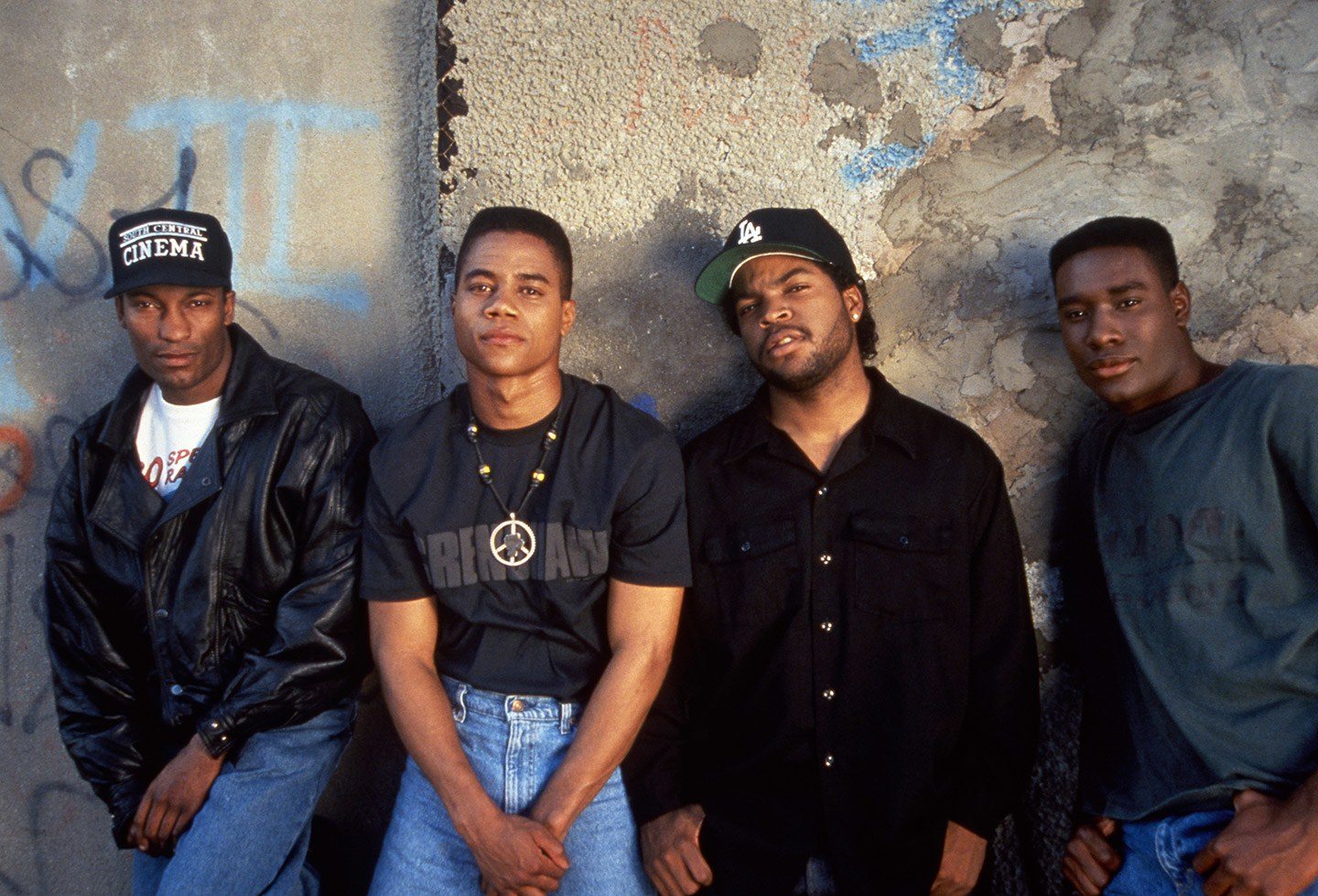
Therefore, though there is unimaginable blame to be put on Hollywood for the damage it has done to the Muslim community, and the fire of Islamophobia its films have lit in America, we cannot sit back and expect Executive Producer X and Director Y to come and tell our stories for us. We cannot sit at home and dust off a misrepresentation of us as a people on screen. We simply have to get wise, get involved, get creative, and start telling our own stories – not on the sidelines, but in the heartland. Because the reality is, whether or not you want to see it, it is Hollywood that runs the narrative.
My earliest memories of life are very few – they range from being fed by my grandmother to wanting to jump down the stairs. But if I stretch it back, the earliest memory that I have, is heading to my grandparents’ house every weekend, where my grandfather would put that one same VHS of Jurassic Park in the video player, and I would watch the Steven Spielberg-directed film over and over again. As I grew slightly older, I imagined being Steven Spielberg myself one day, and making my own movies. Whilst I didn’t follow that exact course, it influenced everything that I did from thereon – pushing my way into the world of media, yearning to tell my stories in my own way. That’s the undeniable power of film.
A quarter of a century later, and I’ve come to the unfortunate realisation that Hollywood doesn’t like my kind.
I’ve also realised though, that it’s too bad – because we Muslims are smart enough to change that.
